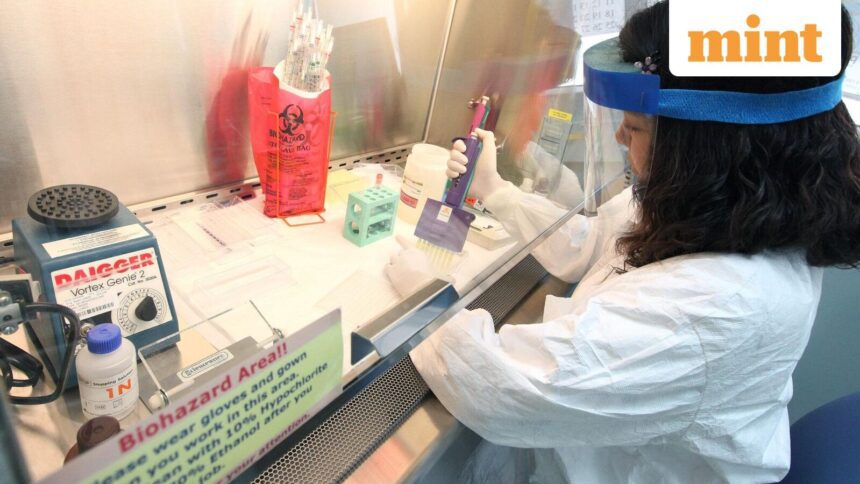Many blood centers in India currently utilize rapid card tests, which are quick, disposable tests that analyze a small blood sample for infections. However, these tests are less sensitive than laboratory-based methods like ELISA (Enzyme-Linked Immunosorbent Assay), which employs enzymes and antibodies to accurately detect viruses and other disease markers in blood.
In light of recent reports of six children in Jharkhand contracting HIV from contaminated blood transfusions at government hospitals, the Central Drugs Standard Control Organisation (CDSCO) has initiated measures to standardize safety protocols and improve regulatory compliance. Under the new guidelines, all blood centers must implement ELISA, recognized as the most effective standard for identifying transfusion-transmissible infections, including HIV, Hepatitis B, and Hepatitis C.
The CDSCO’s proposal, as reviewed by Mint, details requirements for timely renewal of blood center licenses and mandatory testing for transfusion-transmissible infections using ELISA. These measures were discussed in a recent meeting led by the Drugs Controller General of India.
This development holds considerable importance for India’s network of 4,153 licensed blood centers, which are responsible for meeting an annual demand of 14.6 million units of blood. Alongside testing enhancements, the CDSCO has mandated regular inspections for all facilities, including those in government hospitals. The government will ensure that licensing recommendations for charitable and voluntary organizations adhere strictly to the National Blood Transfusion Council (NBTC) guidelines.
According to a CDSCO official, these initiatives are aimed at ensuring facilities comply with blood safety protocols. The official emphasized that licensing for charitable and voluntary organizations must now follow established NBTC guidelines closely, stating, “These steps are expected to create a more robust and safe blood transfusion system.”
Queries to the health ministry remained unanswered at the time of reporting. The document highlights urgent reforms needed to address serious concerns over noncompliance with drug rules observed in hospital-based blood centers.
To rectify these gaps, licensing authorities have been instructed to conduct periodic inspections at all facilities, verifying adherence to applicable regulations. “Special focus may be accorded to the testing of viral markers to ensure the issuance of safe blood,” the document specifies.
This shift is crucial for the public health landscape of India, as ELISA provides higher sensitivity, thereby significantly lowering the risk of “false negatives,” which could prevent contaminated blood from being transfused to vulnerable patients, including those suffering from thalassemia or trauma.
Dr. R. Gangakhedkar, a former scientist at the Indian Council of Medical Research (ICMR), noted that ELISA is more effective than rapid tests in detecting infections during the window period and is capable of identifying infections even when viral loads are minimal. The doctor stated, “This reduces the risk of transmitting transfusion-transmissible infections such as HIV, Hepatitis B, and C to those receiving the blood unit. While rapid tests may be less expensive and quicker, their compliance should be ensured through audits to improve strategies aimed at reducing transfusion-transmitted infections.”
Dr. Anu Kundra, senior vice-president of lab operations at Agilus Diagnostics, described the government’s decision as a “timely and critical public health intervention.” She pointed out that ELISA is a cost-effective method recommended by the World Health Organization for large-scale screening, representing a significant step toward safer transfusions. However, she acknowledged that ELISA has limitations, particularly in its inability to detect infections during the early window period. She added that many advanced centers globally complement ELISA with nucleic acid amplification testing (NAAT) to enhance early detection, despite NAAT being substantially more expensive.
Furthermore, Dr. Kundra warned, “Noncompliance with blood safety protocols can have grave consequences, primarily the transmission of lifelong infections like HIV, Hepatitis B, and C, as well as syphilis.” She elaborated on the risks associated with lapses in screening or handling, which could compromise blood integrity and place recipients at significant risk. “Beyond individual harm, such failures undermine public trust and burden the healthcare system. Rigorous, standardized screening practices like mandatory ELISA testing are absolutely necessary for a safe blood transfusion ecosystem.”
A second CDSCO official mentioned e-RaktKosh, the health ministry’s digital platform that connects blood banks to streamline and monitor operations.










